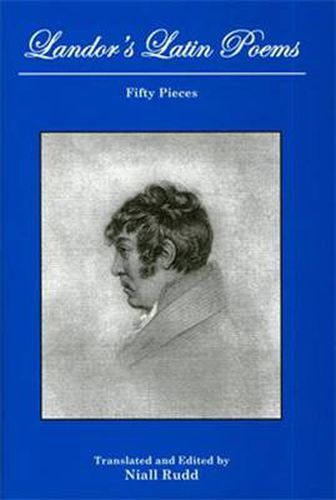Readings Newsletter
Become a Readings Member to make your shopping experience even easier.
Sign in or sign up for free!
You’re not far away from qualifying for FREE standard shipping within Australia
You’ve qualified for FREE standard shipping within Australia
The cart is loading…






This book presents fifty illustrations of Landor’s exceptional dexterity in Latin verse, showing his hostile treatment of political figures (including royalty), his relations with friends, his pleasures and sufferings as a lover, and his delight in the changing phases of nature. The long closing piece treats, within a mythological framework, the great forces that govern the world and its inhabitants. Landor offers an interesting contrast with Dr Johnson, who died in 1784 when Landor was nine and who is sometimes wrongly described as the last important writer with an inner command of Latin. First, though Landor was careless about money, and at times in serious trouble with debt, he had an inheritance which put him in a different position from Johnson’s. Again, while some of Johnson’s Latin poems show a deeply felt belief in religion, Landor’s deities are those of classical paganism. Other points emerge from a consideration of what they owe to their Latin predecessors. Both draw on Vergil-especially on the pastorals (Eclogues). And both are indebted to Horace for the metrical forms which he took over from the Greeks and for his genial good sense. But Horace also wrote some abusive epodes on women (nos. 8 and 12) that, though shunned by the fastidious doctor, foreshadow Landor’s attacks on Princess Caroline of Brunswick.
$9.00 standard shipping within Australia
FREE standard shipping within Australia for orders over $100.00
Express & International shipping calculated at checkout
This book presents fifty illustrations of Landor’s exceptional dexterity in Latin verse, showing his hostile treatment of political figures (including royalty), his relations with friends, his pleasures and sufferings as a lover, and his delight in the changing phases of nature. The long closing piece treats, within a mythological framework, the great forces that govern the world and its inhabitants. Landor offers an interesting contrast with Dr Johnson, who died in 1784 when Landor was nine and who is sometimes wrongly described as the last important writer with an inner command of Latin. First, though Landor was careless about money, and at times in serious trouble with debt, he had an inheritance which put him in a different position from Johnson’s. Again, while some of Johnson’s Latin poems show a deeply felt belief in religion, Landor’s deities are those of classical paganism. Other points emerge from a consideration of what they owe to their Latin predecessors. Both draw on Vergil-especially on the pastorals (Eclogues). And both are indebted to Horace for the metrical forms which he took over from the Greeks and for his genial good sense. But Horace also wrote some abusive epodes on women (nos. 8 and 12) that, though shunned by the fastidious doctor, foreshadow Landor’s attacks on Princess Caroline of Brunswick.